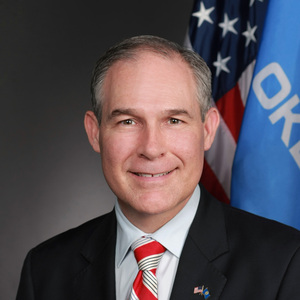Senators question Pruitt on biofuels, RFS

January 18, 2017
BY Erin Krueger
On Jan. 18, the U.S. Senate Committee on Environment & Public Works held a hearing on the nomination of Oklahoma Attorney General Scott Pruitt to serve as administrator of the U.S. EPA. Biofuels were among the topics discussed.
President-elect Donald Trump nominated Pruitt as EPA administrator in early December. Pruitt has served as attorney general of Oklahoma since November 2010. Prior to his election as attorney general, Pruitt served eight years in the Oklahoma senate. His biography posted to the Oklahoma Office of Attorney General website states he is a “leading advocate against the EPA’s activist agenda.” Pruitt has been criticized by the environmental community for being a climate change denier and has fought implementation of the EPA’s Clean Power Plan.
In his opening statement, Pruitt said the EPA services a critical mission in promoting and protecting a strong and healthy environment, but criticized the agency, claiming it “became dissatisfied with the tools congress has given it to address certain issues, and bootstrapped its own powers and tools through rulemaking.” As administrator he said he would work to ensure the EPA has a cooperative and collaborative relationship with congress in fulfilling its intent. “The agency must be committed to using its expertise in environmental issues not to end run congress, but rather to implement its direction, so that congress may decide the proper policies for our Nation, and the EPA can go about the business of enacting effective regulations that survive legal scrutiny,” he said. “The purpose of regulation is to make things regular, to put the public on clear notice of its obligations, and to do so fairly, without picking winners and losers. I look forward to working with each of you to accomplish this goal.” In his statement, Pruitt also said he believes states should “remain our nation’s frontline environmental implementers and enforcers,” and indicated he thinks “environmental regulations should not occur in an economic vacuum.”
Advertisement
“It is not EPA’s mission to be against sectors of industry in general, or against particular states,” Pruitt continued. “My first and primary goal as administrator will be to return the agency to that core mission of protecting the American people through common sense and lawful regulations.”
The bulk of the hearing focused on Pruitt’s ties to the fossil fuel industries, views on climate change, and questions over possible conflicts of interest in the event Pruitt is charged with implementing the same regulations he has filed lawsuits against during his time as attorney general. Several senators also questions his views on biofuels and the renewable fuel standard (RFS). Sens. Deb. Fischer, R-Neb.; Joni Ernst, R-Iowa; and Tammy Duckworth, D-Ill., were among those posing specific questions over Pruitt’s stance on the RFS.
Advertisement
Pruitt said he believes it is very, very important to honor the intent of the RFS statute. It’s not the job of the administrator of the EPA to do anything other than administer the program according to the intent of congress, he said, noting he commits to do so. Regarding waivers, Pruitt said his view is they should be used judiciously and noted there is a reason that congress developed statutory volume objectives. While Pruitt stressed the market has changed since the RFS was first implemented in 2005, he also said he thinks the use of waivers should be consistent with the will of congress.
Questions over the RFS also addressed the role of rulemaking delays and volume waivers in decreasing program certainty and reducing investment in advanced biofuel projects. Again, Pruitt noted that he believes the discretion given to the EPA administrator under the RFS program should be used judiciously when it comes to waivers so as to not undermine the program.
When questions on his past statements that the RFS is unworkable and a flawed program, Pruitt continued to stress that his role as administrator would be to implement the program according to current statute. He was also asked about his position regarding the current point of obligation issue. In response he noted that the comment period is not yet complete on the issue and said there are many aspects of the program that need to be better administered by the agency.
A replay of the hearing, which spanned more than seven hours, should be available soon on the Senate Committee on Environment & Public Works website.
Related Stories
The U.S. EPA on July 8 hosted virtual public hearing to gather input on the agency’s recently released proposed rule to set 2026 and 2027 RFS RVOs. Members of the biofuel industry were among those to offer testimony during the event.
The U.S. exported 31,160.5 metric tons of biodiesel and biodiesel blends of B30 and greater in May, according to data released by the USDA Foreign Agricultural Service on July 3. Biodiesel imports were 2,226.2 metric tons for the month.
The USDA’s Risk Management Agency is implementing multiple changes to the Camelina pilot insurance program for the 2026 and succeeding crop years. The changes will expand coverage options and provide greater flexibility for producers.
EcoCeres Inc. has signed a multi-year agreement to supply British Airways with sustainable aviation fuel (SAF). The fuel will be produced from 100% waste-based biomass feedstock, such as used cooking oil (UCO).
President Trump on July 4 signed the “One Big Beautiful Bill Act.” The legislation extends and updates the 45Z credit and revives a tax credit benefiting small biodiesel producers but repeals several other bioenergy-related tax incentives.
Upcoming Events










